5 Tips to Stop Cravings From a Registered Dietitian
Do you eat “well” all day, but can’t put down the box of cookies at night? Or a handful of chips? Or a spoonful of peanut butter? I gotchu… I’m sharing 5 dietitian-approved tips to stop cravings you need to try ASAP!
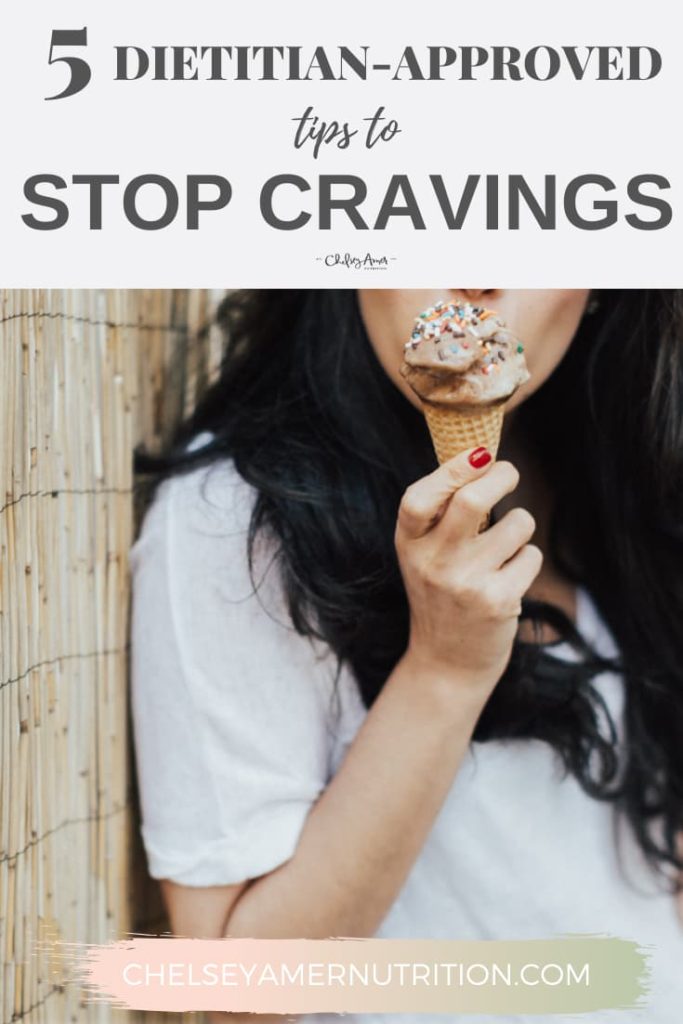
One of the most common questions I receive as a registered dietitian is “How can I stop cravings?”
Whether it’s sugar, salty snacks, carbs, fried foods… cravings are human! We all have ’em!
That’s why today I’m sharing dietitian-approved tips to stop cravings…
How you handle cravings largely has to do with your relationship with food, history of restrictive dieting, and honestly, what behaviors were modeled to you from childhood.
What are food cravings?
Cravings are an intense desire for something. They typically feel urgent. Like you HAVE to get your hands on a chocolate chip cookie ASAP!
If you struggle with sugar cravings or late night snack cravings, you’re not alone! It’s one of the biggest hurdles my clients and NTP students face.
Why do we have food cravings?
There are many factors behind the origin of food cravings.
Scientists have discovered that cravings are caused by the regions of the brain that are responsible for memory, pleasure, and rewards.
You know what that gooey, warm chocolate chip cookie tastes like. Maybe you have childhood memories tied to it. They likely gave you immense pleasure. Your brain may register you eating a chocolate chip cookie as a reward.
Cravings can also be hormonally-driven. Not only do your cravings increase during PMS, but an imbalance of your hunger and fullness hormones (ghrelin and leptin) or happiness hormones, like serotonin, can also cause food cravings.
A popular myth about cravings is that they’re due to a nutrient deficiency. For example, craving a burger around your period because you lose iron at that time of the month. Actually, the jury is still out on this one and this is more anecdotal than based in science.
There are many more “influencing factors” (as I like to call them) for why we have food cravings. It’s not as simple as because you’re getting your period or you have childhood memories tied to a food. We explore these other influencing factors in my Nutrition Training Program.
Identifying a Craving
The hardest part about a true craving is identifying it. What is it EXACTLY that you are craving?
Identifying your craving is a key part in navigating how to handle food cravings. If you’re not sure what you’re craving… search for it!
The last thing we want to do when trying to satisfy a craving is eat around the craving. Instead we want to pinpoint the craving, eat and enjoy that food… without guilt!
When you eat around your craving, you’re not only more likely to consume more calories and eat more than your body needs, but feel guilty after honoring your craving.
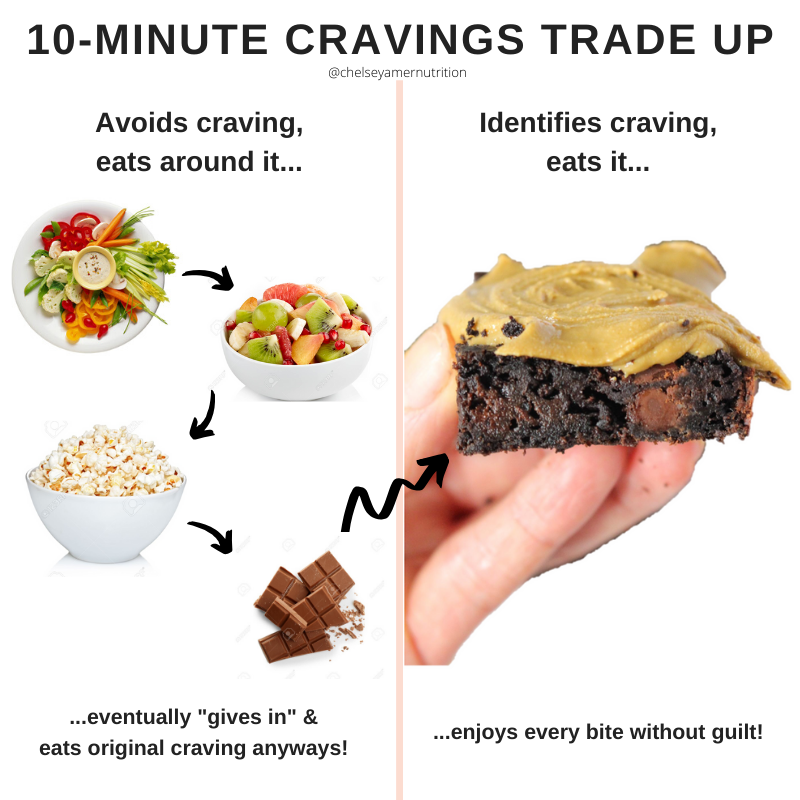
But what if there was a way to stop cravings in the first place?
I’ll be the first to tell you it’s impossible to stop ALL cravings. It’s just not human behavior.
Sure, you can learn to ignore your cravings and deprive yourself of your favorite fun foods, but what good is that? Food is meant to be fun and enjoyed!
But there are ways you can minimize your cravings and conquer constant, unwanted cravings.
Here are 5 Dietitian-Approved Tips to Stop Cravings…
Tip #1: Eat well-balanced + satisfying meals
OK, so if you know me and my nutrition philosophy, you’re probably not too surprised by this one. But I constantly remind you to eat well-balanced meals because it works!
Many clients and Nutrition Training Program students come to me avoiding an entire food group, like carbohydrates for example. They think it’s counterintuitive when I encourage them to eat carbohydrates at every single meal.
Chelsey, how will I lose weight if I eat carbs?! GASP!
In reality, by eating a balance of nutrients at every meal, you will be more satisfied, and actually reduce your cravings and mindless munching throughout the afternoon and evening.
A balance of nutrients – carbs, protein, and fat is a satisfying combination. When we’re satisfied from the food we eat, we’re less likely to crave any one food group.
ACTION TIP: Try to include 1 carbohydrate, 1 protein, and 1 fat at every meal. Checkout the linked posts if you’re unsure what these foods are.
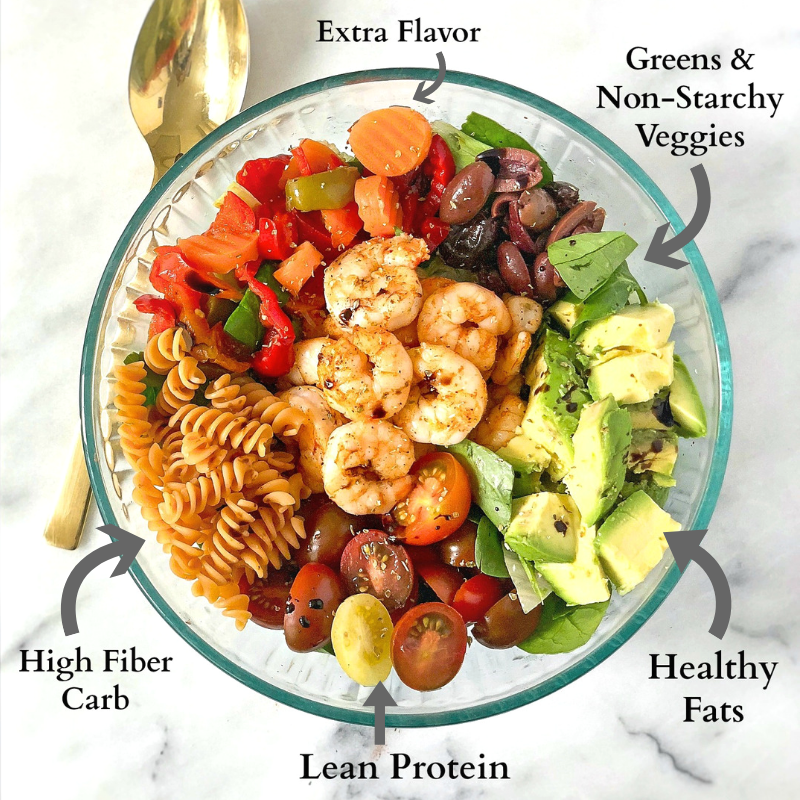
Tip #2: Stay hydrated
Hydration is so important that I created an entire email challenge around it! You can sign up for my Hydration E-Mail Challenge HERE!
Hydration influences SO many different aspects of your health and well being… including food cravings.
Water helps transport nutrients around your body. When you’re under-hydrated, that lack of fluid can make it difficult for organs, like your liver, to release glycogen (stored glucose) and other components from your energy stores. When your body doesn’t have enough glucose, it can trigger food cravings.
Even more, under-hydration can increase your hunger, only further boosting your cravings.
ACTION TIP: Aim to drink enough so that you’re urine is pale yellow. For most healthy individuals this will be about 2 liters per day.
Tip #3: Get 7-9 hours of sleep per night
A lack of sleep can increase your hunger hormones and increase cravings. What a combination!
When you’re tired, your body wants quick energy…. like a sugar spike. Usually you may recognize this as a craving for easy to digest carbohydrates, like bread, desserts, or candy.
You can fight these cravings, but if you’re consistently over-tired, eventually your willpower will lose.
The only way to remedy this is to consistently sleep enough.
ACTION TIP: Most individuals require about 7-9 hours of sleep each night. Create a bedtime routine to signal to your body that it’s time to wind down.
Tip #4: Give yourself permission to enjoy your favorite fun foods, whenever you want them
This one may seem counterintuitive, but if you give yourself permission to enjoy your favorite fun foods, you won’t crave them as much.
In my Nutrition Training Program I go into detail about how to include your favorite fun foods into a well-balanced diet. Yes, you can have that burger + fries and still feel good! You can include cookies into your regular diet.
The key is HABITUATING to your favorite foods. When we place foods off-limits, we want them more. Think about it – you want what you can’t have! (It’s kind of like dating in your early 20s!)
When you give yourself permission and consistently expose yourself to these foods, the novelty wears off. You become habituated to these previously “forbidden foods.”
But you may have a journey to get to a place where your previously “forbidden foods” are off of their pedestal. Support and accountability can help to prevent a dieting mentality from creeping back in. I’m here for you!
ACTION TIP: give yourself unregulated permission to enjoy your favorite foods in order for your cravings to dissipate.
Here are some tips:
- Stop referring to foods as “good” or “bad” – food cannot inherently have these qualities.
- When you want a food, give yourself permission to eat it.
- Don’t restrict the amount of food you eat. At first it may take more cookies to feel satisfied. Over time, this will decrease as your body (mentally and physically) knows it can eat this food at any time.
If you want support implementing these practices, reach out! This is exactly what I cover in my Nutrition Training Program!
Tip #5: Manage your stress without food
Stress can also spike your food cravings. It’s hormonal. Your stress hormones make you crave comfort foods that are typically high in carbohydrates and fat.
ACTION TIP: Focus on non-food related ways to manage your stress…
- Get adequate sleep
- Try different relaxation techniques
- Meditate
- Do deep breathing exercises
- Laugh more
- Have positive relationships
DON’T FORGET TO PIN IT…
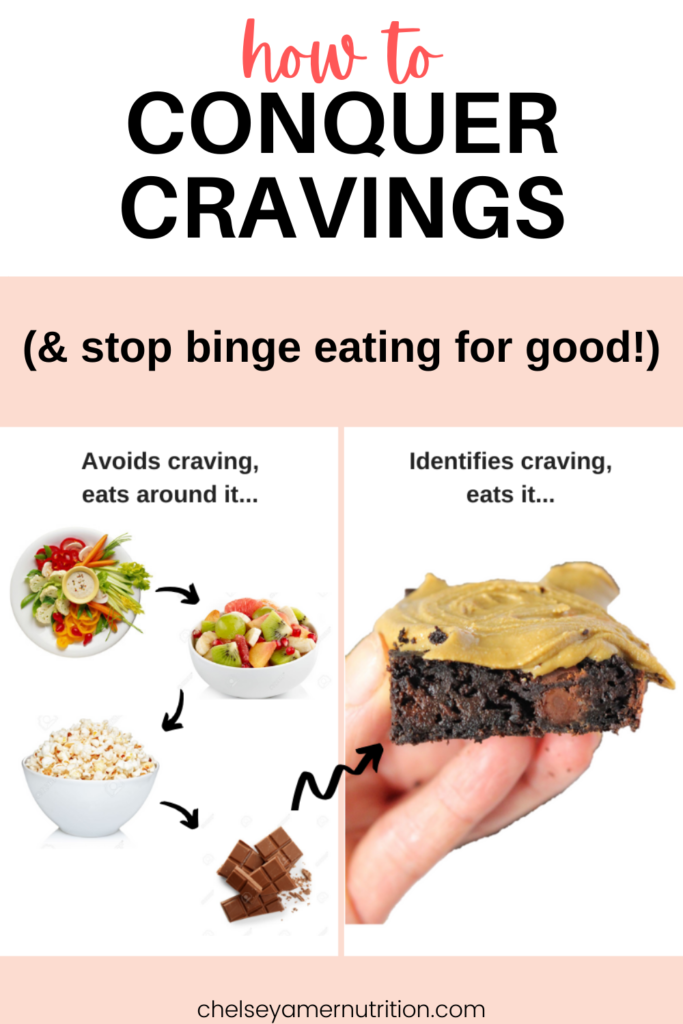
Which tips to stop cravings will you try first?
And there you have it… 5 tips to stop cravings in the first place!
But if you are struggling with food cravings, I encourage you to join my Nutrition Training Program where we discuss how to conquer cravings, eat a well-balanced diet, break free from food rules, and more. Check it out!
XO


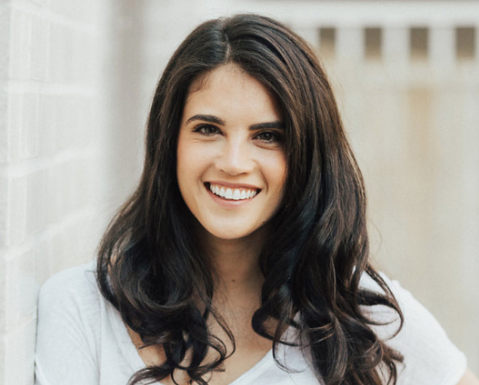 Hi there!
Thanks for stopping by! I'm Chelsey, an online Registered Dietitian, recipe developer, budding photographer, and coffee addict! My mission is to help you feel good through food by answering the question "What should I eat?" Let's make nutrition approachable!
I hope you enjoy my personal collection of simple, healthy, food allergy friendly and nutritiously delicious recipes, plus tips and tons of tricks that will help YOU live a nutritionally-balanced life! I look forward to getting to know you better...
Hi there!
Thanks for stopping by! I'm Chelsey, an online Registered Dietitian, recipe developer, budding photographer, and coffee addict! My mission is to help you feel good through food by answering the question "What should I eat?" Let's make nutrition approachable!
I hope you enjoy my personal collection of simple, healthy, food allergy friendly and nutritiously delicious recipes, plus tips and tons of tricks that will help YOU live a nutritionally-balanced life! I look forward to getting to know you better...







